|
|

The Sex Blog Of Record
Saturday, March 16th, 2024 -- by Bacchus
In 2022 y’all may remember that I gave a poor review to Tumblr’s so-called unbanning of porn. While they did jettison the ludicrous prohibition on female-presenting nipples they inherited from Verizon/Yahoo, my conclusion was that the overall changes in 2022 were “pretty much totally a scam” because of near-total search invisibility for adult material.
At the time, however, I gave Tumbler’s Matt Mullenweg credit for writing the single most-honest explanation from a social media platform perspective about why porn-friendly social media was, in his opinion, essentially impossible in 2022. I linked and quoted extensively from Matt’s Tumblr post Why “Go Nuts, Show Nuts” Doesn’t Work in 2022. Well, now, guess what? I just tried to follow that link to revisit his essay, and look what I got!

As it happens, I think that Matt’s unusually-open essay from the perspective of a social media owner/operator is an important document in the history of censorship battles, the pornocalypse, and the contest between closed social media silos and the open web. So here’s an open link (no login required) to his essay in the Internet Archive:
Why “Go Nuts, Show Nuts” Doesn’t Work in 2022
And here, because diversity in archiving is good, is another copy:
Why “Go Nuts, Show Nuts” Doesn’t Work in 2022
For those who don’t know or remember, Tumblr used to have a policy around porn that was literally “Go nuts, show nuts. Whatever.” That was memorable and hilarious, and for many people, Tumblr both hosted and helped with the discovery of a unique type of adult content.
In 2018, when Tumblr was owned by Verizon, they swung in the other direction and instituted an adult content ban that took out not only porn but also a ton of art and artists – including a ban on what must have been fun for a lawyer to write, female presenting nipples. This policy is currently still in place, though the Tumblr and Automattic teams are working to make it more open and common-sense, and the community labels launch is a first step toward that.
That said, no modern internet service in 2022 can have the rules that Tumblr did in 2007. I am personally extremely libertarian in terms of what consenting adults should be able to share, and I agree with “go nuts, show nuts” in principle, but the casually porn-friendly era of the early internet is currently impossible. Here’s why:
- Credit card companies are anti-porn. You’ve probably heard how Pornhub can’t accept credit cards anymore. Or seen the new rules from Mastercard. Whatever crypto-utopia might come in the coming decades, today if you are blocked from banks, credit card processing, and financial services, you’re blocked from the modern economy. The vast majority of Automattic’s revenue comes from people buying our services and auto-renewing on credit cards, including the ads-free browsing upgrade that Tumblr recently launched. If we lost the ability to process credit cards, it wouldn’t just threaten Tumblr, but also the 2,000+ people in 97 countries that work at Automattic across all our products.
- App stores, particularly Apple’s, are anti-porn. Tumblr started in 2007, the same year the iPhone was released. Originally, the iPhone didn’t have an App Store, and the speed of connectivity and quality of the screen meant that people didn’t use their smartphone very much and mostly interacted with Tumblr on the web, using desktop and laptop computers (really). Today 40% of our signups and 85% of our page views come from people on mobile apps, not on the web. Apple has its own rules for what’s allowed in their App Store, and the interpretation of those rules can vary depending on who is reviewing your app on any given day. Previous decisions on what’s allowed can be reversed any time you submit an app update, which we do several times a month. If Apple permanently banned Tumblr from the App Store, we’d probably have to shut the service down. If you want apps to allow more adult content, please lobby Apple. No one in the App Store has any effective power, even multi-hundred-billion companies like Facebook/Meta can be devastated when Apple changes its policies. Aside: Why do Twitter and Reddit get away with tons of super hardcore content? Ask Apple, because I don’t know. My guess is that Twitter and Reddit are too big for Apple to block so they decided to make an example out of Tumblr, which has “only” 102 million monthly visitors. Maybe Twitter gets blocked by Apple sometimes too but can’t talk about it because they’re a public company and it would scare investors.
- There are lots of new rules around verifying consent and age in adult content. The rise of smartphones also means that everyone has a camera that can capture pictures and video at any time. Non-consensual sharing has grown exponentially and has been a huge problem on dedicated porn sites like Pornhub – and governments have rightly been expanding laws and regulations to make sure everyone being shown in online adult content is of legal age and has consented to the material being shared. Tumblr has no way to go back and identify the featured persons or the legality of every piece of adult content that was shared on the platform and taken down in 2018, nor does it have the resources or expertise to do that for new uploads.
- Porn requires different service providers up and down the stack. In addition to a company primarily serving adult content not having access to normal financial services and being blocked by app stores, they also need specialized service providers – for example, for their bandwidth and network connections. Most traditional investors won’t fund primarily adult businesses, and may not even be allowed to by their LP agreements. (When Starbucks started selling alcohol at select stores, some investors were forced to sell their stock.)
If you wanted to start an adult social network in 2022, you’d need to be web-only on iOS and side load on Android, take payment in crypto, have a way to convert crypto to fiat for business operations without being blocked, do a ton of work in age and identity verification and compliance so you don’t go to jail, protect all of that identity information so you don’t dox your users, and make a ton of money. I estimate you’d need at least $7 million a year for every 1 million daily active users to support server storage and bandwidth (the GIFs and videos shared on Tumblr use a ton of both) in addition to hosting, moderation, compliance, and developer costs.
I do hope that a dedicated service or company is started that will replace what people used to get from porn on Tumblr. It may already exist and I don’t know about it. They’ll have an uphill battle under current regimes, and if you think that’s a bad thing please try to change the regimes. Don’t attack companies following legal and business realities as they exist.
It’s an important snapshot of a moment in adult social media history, and it needs to be publicly viewable for future scholars, researchers, and commentators.
Similar Sex Blogging:
Wednesday, January 2nd, 2019 -- by Bacchus
I thought I was so damned clever.
I was trying to fix a busted Tumblr link in a post from 2010. First I checked the Wayback Machine, but it only had two crawl snapshots and both of them were broken. (They were empty redirects from some point when Tumblr was jerking web crawlers around.)
Then I had a bright idea. Hey! Isn’t this one of the Tumblrs I backed up myself using HTTRack? I checked, and it was. Glory! I should have that post saved right here, on my very own hard drive. I can’t fix the link with that, but I could snag the content and rewrite my own post to quote it, replacing the dead link that way. Yay.
Like I said, I thought I was so damned clever. It took some rummaging to find that post on my hard drive, but finally I was in the correct subdirectory. Bing! There was the .html. Bam! There’s a media file. Boom! I win…
Boom. I do not win. Pornocalypse. Fuck:
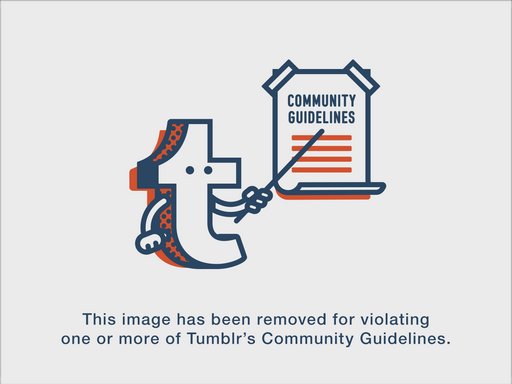
A long time ago, before Tumblr just started deleting whole porn blogs, their moderators would sometimes replace an image with this lecturing Tumblr-mascot. This was years ago. But some time between when I built the link in 2010 and when the entire Tumblr in question got blown away by the recent sweeping #pornocalypse, apparently this one post fell afoul of… well, we’ll never know, now.
There was a time when I could have worked though the Tumblr notes archived with my missing post, looking for sites that reblogged it, and trying those reblogs one-by-one in the WayBack Machine until I found one that got archived before the mishap that got the image replaced by Professor Guidelines. That’s the kind of obsessive research I do, sometimes. And I tried it, but no joy. It’s all broken parts and missing pieces now. There’ not enough left anywhere to piece anything together. Every site that ever reblogged that post is gone now, or locked up tight inside Tumblr’s “sensitive materials” gulag. And none of them ever got archived; none are in the WayBack Machine.
Yeah. It’s just a broken link, Bacchus. Let it go. Yeah, no, I know. I don’t have any other choice, do I?
Pornocalypse. Fuck!
Similar Sex Blogging:
Wednesday, December 5th, 2018 -- by Bacchus
My post this morning gave you the tools to backup and save your own porn tumblr, plus perhaps a handful of others. Good. You’ve carried your fully-loaded book bag safely out of the burning library. Now what else can you do?
Say hello to our rogue archivist friends at Archive Team. Powered by “rage, paranoia, and kleptomania” in all their data-rescue efforts, their Tumblr project page and associated IRC channel indicate that they’re rumbling and grumbling into full power-up mode on this Tumblr #pornocalypse crisis. Their previous data-rescue exploits are legendary. They can’t get it all, but they are going to get a bunch. How can we, how can you, help?
I’ve been monitoring their public-facing channels. From what I can tell, here’s what’s going on. They are tweaking the scripts for the software they use for distributed scraping and downloading. (They call it “Archive Team Warrior.”) When Warrior is ready — hopefully real soon now — if you’ve got a good internet connection you could help by running an instance of that.
But even before it starts to run, they need a list of Tumblr porn blogs to feed into the Warrior. They’ve already got lists of course, massive ones. But the lists are far from complete. They want more and better ones. There’s a web form here where you can contribute your favorite porn Tumblr URLs. The form accepts ten URLs at a time, but you can fill it out as many times as you like. And if you have a much bigger list? Just paste it up online somewhere and paste the URL to that into the form — they’ll make it work.
All told, based on past experience, they figure they have time and bandwidth and volunteers enough to rescue maybe 60 terabytes of porn blogs. That’s enormous — but it’s only a tenth, maybe a twentieth, of the total amount of the porn on Tumblr. (Everybody is guessing; these are wild-ass guesses.) Still, it will be a massive save if it works. What will happen to all that data?
Eventually — and these things can take a lot of time — the idea is that rescued blogs can end up in the Wayback Machine at the Internet Archive. Every terabyte that winds up in the Wayback machine adds, they estimate, about $1500 to $2,000 in long term cost. Archive.org donations are needed, and welcome.
Wednesday, December 5th, 2018 -- by Bacchus
OK, Monday was our day to smack foreheads and react to the Tumblr porn ban. Tuesday was our day to mourn the loss of communities. For people who need a new home, yesterday began the migration process, or at least the search for a destination. Today? For me it’s a day to act. I’m a porn curator, and I’m aghast at the collections that will burn on December 17. What little I can do to fight those fires starts today.
Five years ago when I first saw this shitshow coming, I researched and advised the community on backup options for adult tumblrs. But since then, Tumblr has taken several technical steps to make porn tumblrs harder to view or copy. And fundamentally, I’m a technical idiot. I gloomily thought all my old advice was obsolete, which is why I wrote this fundamentally wrong depressed Eeyore shit on Monday:
I haven’t tested, but I don’t think the advice in that post would work any more, now that you have to be logged in to Tumblr even to view your own porn blog. (I could be wrong.)
Reader, I was wrong. After consulting with my good friend Dr. Faustus at Erotic Mad Science, who is technically sharper than me and who has spent much of the past five years diligently rescuing material of interest from Tumblr and turning it into a deep and intricate set of self-hosted blogs, he pointed me at some instructional material that set me straight. It turns out that I can pick the best backup solution from my old article, add one screenshot with a single new setting (the password/login you need to be able to see porn on Tumblr), and we are back in backup business! (Product best when used before December 17, 2018, contents may settle in shipping.)
How To Back Up An Adult Tumblr
These are instructions for using HTTrack/WinHTTrack Website Copier to make a local mirror of any Tumblr in a folder on your hard drive. HTTrack is a free-software GPL general utility for copying and mirroring websites, available for most current versions of Windows as well as for a wide variety of Linux/Unix flavors. The Windows version presents a fairly old-fashioned interface with a bunch of cryptic options, but most of them come pre-set with sensible defaults that you actually don’t need to mess with. Plus, there’s good documentation.
Download the software and install it. Windows will probably try to scare you out of completing the install. Be bold, be brave. Trust your open source software developers.
Now run the the software. You’ll be presented with a welcome screen where you need to click “Next”. Then, this screen:
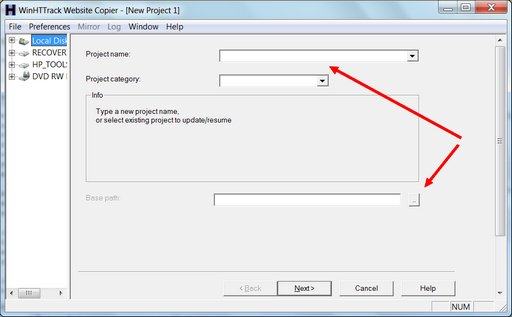
The arrows show you the two fields that need your attention. All you really need to do is give this backup project a name and tell the software where to save the backup. Then hit “Next”:
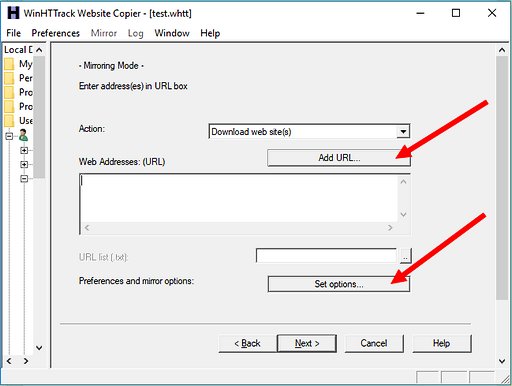
The two red arrows above screen point to mandatory buttons that need our attention. The first one opens the screen where we tell Tumblr the URL of the porn tumblr you want to download. It will be something like: http://yourtumblr.tumblr.com — this doesn’t have to be your tumblr URL though, it can be any tumblr you want to save, like one that nobody has updated in five years that you know will be going dark in two weeks. This is also where you input your Tumblr login information, to prove to Tumblr that you’re special enough to view porn. This does have to be your login, no matter whose blog you are downloading.
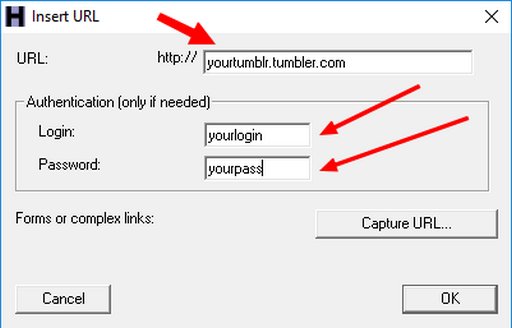
The next screen is the one you see when you push the “Set options” button, which is absolutely vital. When you do, you’ll see this:
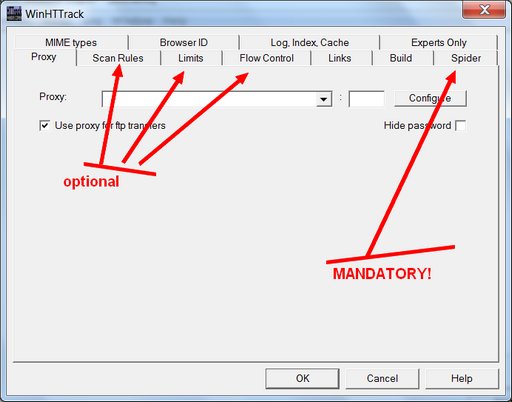
I’ve pointed arrows at three optional settings tabs that you may want to adjust, and at the one mandatory options tab where you must change a setting. I’m going to ignore the optional ones for now, except to say that you would tinker with these if you wanted to change the sorts of media files you’re saving beyond the basic .gif, .jpg, and .png (you’d need to do this if you were saving a Tumblr that had .wav files or .zip files or .mp3s), or if you need to limit this program from slamming your internet connection too hard. It’s the mandatory “Spider” tab you really need to click:
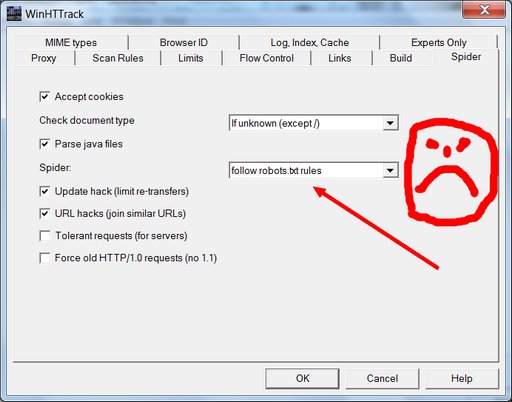
See the box where it says “follow robots.txt rules”? Change it using the drop-down menu to say “no robots.txt rules” so that this software (your robot) will know to ignore Tumblr’s robot-hostile electronic “keep out” signs.
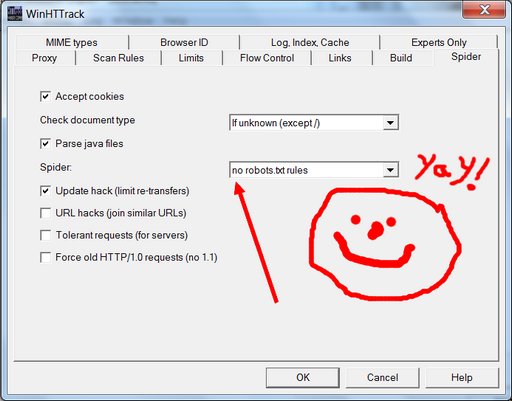
Yay! We’re almost done. Hit the “OK” button, hit “Next”, hit “Finish”, and your site copying should begin.
How long it will take to finish depends on the available bandwidth of your net connection, the memory and processing speed of your computer, and on whether you tweaked any of the options that control things like how many simultaneous connections your computer is making and how many files it’s trying to download in parallel. It also depends on how many pages there are on the Tumblr blog you are backing up, and on how big the images are. The default settings seem to be fairly gentle about not maxing out your internet connection or putting an unruly amount of strain on the server at the site you are trying to copy. Using default settings and a fairly crappy internet connection, I downloaded an ancient porn blog overnight last night. It had 3,300 posts and took up 1.8GB on my hard drive.
What does success look like? You’ll have a folder on your hard drive with the name you provided on the first options screen. If you open it, you will find many sub-folders, and much that may seem mysterious. You should also find a file called “index.html” — and if you click on it, it should open in a new browser window where you’ll be looking at your backed up Tumblr site, using nothing but the files on your hard drive.
What have we not accomplished? Well, you’ve made what should be a full and true copy, but it’s not a nice clean export in some standard format that you could use to easily import all your posts into another content management system or blogging tool. HTML files and related images are scattered through a system of directories and subdirectories that, while logical, may not be the simplest thing to work with. Using the data you’ve got, a clever computer person could generate an XHTML document (or something similar) that could be semi-automatically imported into (say) WordPress. But it would take parsing; it would take work. Figuring out how to take the copy you just made and turn it back into a non-Tumblr website is a solvable problem, but how easy or hard it might be to actually do it depends on your access to computer expertise and tools. For now, you’re safe in the knowledge that you’ve got all the posts you’ve made this past however-many years. You’ve got the images, you’ve got their metadata (any tags you set for them and any credits you may have reblogged or included) and you’ve got the clever things you said about them, all, safe on your hard drive.
Now would be a good time to back up your hard drive. I’m just sayin’.
Additional caveats and warnings and gotchas and thoughts:
1) This might or might not work on your own porn tumblr after December 17. Tumblr hasn’t said it will delete porn, just that it will make it invisible to everyone but the owner. But I don’t trust them not to continue deleting stuff. I wouldn’t wait. And for any blog you don’t own, this will almost certainly stop working. Every old porn tumblr that is no longer being updated? This is a way to make a copy on your hard drive. Hurry! Don’t wait. Hell is coming, but so is December 17. December 17 will get here first.
2) You have to type your Tumblr login and password into HTTrack to use this method. There’s a good chance that login information gets recorded in the many complex files HTTrack writes to your hard drive. If you ever turn those files over to someone who is, say, helping you convert those files into a WordPress blog — or if, say, you send them off to the Internet Archive for posterity — your password could be exposed. It might be smart to set up a “burner password” on Tumblr that you never used anywhere else and will never use again before firing up HTTrack.
3) There is a method offered by Tumblr for doing a fancier and more complete export of the Tumblr blogs that belong to you, including some of the social interaction metadata. I have not covered it here because it appears not to be very reliable; in every case available to me for testing, it failed permanently with a “processing backup” message that never ends or goes away. So I decided not to waste your time with the instructions for making that attempt. I have heard precisely one account on Twitter of a successful official export.
I hope this helps!
Monday, December 3rd, 2018 -- by Bacchus
It’s official: Tumblr has banned porn, effective December 17, 2018. Rest in obscurity, Tumblr.
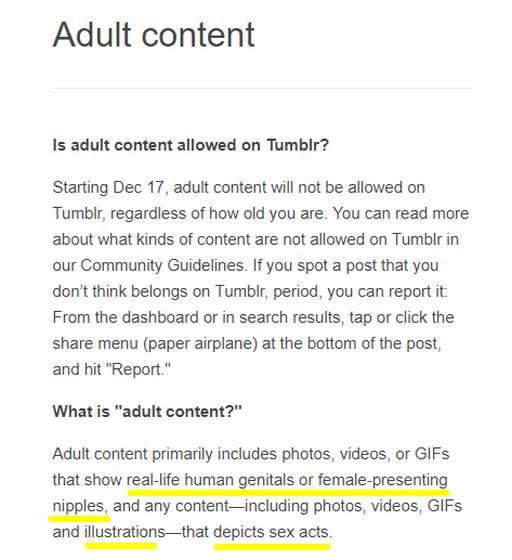
This is not a surprise to me; I officially gave up on Tumblr for grownups in summer of 2017, when I wrote:
We all knew that Tumblr’s run as the place to run free porn blogs had to end someday.
And:
So it is now official. The ghetto walls are up and the gates are closed. The adult-Tumblr community is no longer part of the open web. The #pornocalypse has claimed another social media victim.
It was five, almost six years ago now that I offered adult bloggers on Tumblr advice on how to back up their Tumblr porn blogs and escape from that particular prison. I haven’t tested, but I don’t think the advice in that post would work any more, now that you have to be logged in to Tumblr even to view your own porn blog. (I could be wrong.) Still, it gives you an idea. It wasn’t hard to see this disaster coming.
Indeed, this disaster was always coming. It’s an ErosBlog byword: The Pornocalypse Comes For Us All. Wherever you are. On every platform. The #pornocalypse is coming. It will find you. It always does. The internet uses porn to jumpstart every new tech and platform, and then when things get respectable and profitable, porn gets thrown unceremoniously out with the garbage, to “clean things up around here” for the squeamish bankers and capitalists. Thus does the pornocalypse come for us all. Over and over again. It’s an endlessly repeating pattern.
Hence, Bacchus’s First Rule Of The Internet: “Anything worth doing on the internet is worth doing at your own domain that you control.” Put it on your own website first and primarily. Use all the other platforms to promote your site. That way, the endless rolling #pornocalypse? It can’t hurt you quite as much. It still hurts, but it can’t disasterize you, not like it does if you build your digital life on a platform they can take away.
I wrote off Tumblr a long time ago. But I still hate them fuckers for all the people they are making digitally homeless in two weeks. I saw it coming, yeah. But that doesn’t make me feel smarter and smug; it just makes me feel helpless and ragey. I’m sorry, everyone.
The #pornocalypse comes for us all.
Update: Tumblr finally published a blog post supposedly explaining the policy change. It’s a bunch of disconnected marketing blather that does nothing of the sort; I won’t waste your time by reproducing it here. The closest thing to a concrete explanation given is that by banning porn they hope to “create a place where more people feel comfortable expressing themselves.” Yeah, good luck with that.
Monday, July 31st, 2017 -- by Bacchus

Back in June when Tumblr announced that blogs containing “primarily explicit content” would no longer be visible on the open web (but only to logged-in Tumblr users), I wrote:
Although the email does not say so, I predict that explicit-content blogs will go back to flying that involuntary robots.txt that makes them invisible to the search engines, too. No more outside search-discovery for Tumblr porn!
That day is here, and it gives me no pleasure to announce that I was right. A reader forwarded the email they got from Tumblr:
We’re contacting you to let you know that your Tumblr has been marked as containing explicit content. This means it won’t be visible to minors, people who are using Tumblr in Safe Mode, and people who aren’t logged into Tumblr.
No mention of search, but when I went to check the robots.txt on their Tumblr, sure enough:

As I explained in Thou Shalt Not Search Adult Tumblr Blogs back in 2013 when Tumblr first tried to sneakily hide all the porn blogs:
In robot, that means, roughly “All robots: stay out!” No search spiders allowed. No Internet Archive crawler. The tumblr is there, but you have to know about it, or you have to be linked to it. You won’t find it in Google, you won’t find it in any other search engine that honors robots.txt, and when Tumblr decides to stop hosting it, you won’t find the pages in the Wayback Machine – it will be gone for good, lost to humanity unless somebody with the technical chops and outlaw sensibilities of Archive Team finds a way to archive it anyway, robots.txt be damned.
So it is now official. The ghetto walls are up and the gates are closed. The adult-Tumblr community is no longer part of the open web. The #pornocalypse has claimed another social media victim.
Image credit: the graphic at the top of the post has been adapted from part of a panel that appeared in Action Comics #292 (1962).
Similar Sex Blogging:
Sunday, March 20th, 2016 -- by Bacchus
The notion of making the porn you want to see in the world has been an interest of mine for some time, although I personally don’t have the right sort of creative skills to do very much of it. My friend and erstwhile co-blogger Dr. Faustus wrote an epic sequence of posts on making your own porn back in 2011, and he’s been practicing what he preaches (most notably but by no means exclusively with his Gnosis College series of comics) for longer than that. So it’s natural enough that when I see a headline like “DIY Tumblr Porn: The Porn Movement We’ve All Been Waiting For?” I would parse it as potentially relevant to my interests.
You can imagine, then, my disappointment upon reading this sentence in the fourth paragraph:
Log in to Tumblr, however, and it’s unlikely you’ll find anything resembling hardcore pornography. Instead, you’ll find erotic and even romantically-charged content that couldn’t be further from the fake orgasms and artificiality of mainstream porn.
Am I the only one who feels this sentence disqualifies the author from any claim of knowing anything about mainstream porn or Tumblr?
If you’re interested in the phenomenon of people who make porn to share on Tumblr, you’ll find some things of interest in the article. But the notion that Tumblr isn’t first and foremost full of the same commercial porn the author disdains with words like “artificiality” suggests a dangerous lack of familiarity with Tumblr for someone writing about it for an audience. Worse, the notion that “mainstream porn” (whatever that means) can be somehow typified by the most boring and least authentic material in the genre suggests (and this is me being charitable) a lack of familiarity with the truism that is Sturgeon’s Law: “90% of everything is crap.”
I’m not going to list any more of the ill-informed negative generalizations about commercial porn from the article. The obligatory quote from a sex-negative “therapist” with a book to sell on the “problems caused by pornography” didn’t help much either. Yes, there are people making porn for primary publication on Tumblr. But if you want to learn very much about that phenomenon and how it fits in the broader picture of commercial porn generally or the most recent pornographic innovations of whatever kind, this article will prove shallow and disappointing. Once again, I look at these things so you don’t have to.
Similar Sex Blogging:
Wednesday, April 15th, 2015 -- by Bacchus
Does anybody remember when, back in 2013, I blogged about how Tumblr was blocking selected adult links, in particular ones to a clip-sale place called Extra Lunch Money? It was a prior restraint sort of block; you’d hit the post button and if the offending link was present, you’d get a cryptic red “there was a problem saving your post” response.
My prediction back then was that Tumblr would, when caught, claim that the prior link restraint was a glitch:
Beginning during the negotiation of the sale to Yahoo, Tumblr’s practice has been to disadvantage its adult content in silent and hard-to-notice ways, even when that content was fully-consistent with its fairly permissive community guidelines. What’s more, when forced to backtrack by public outrage after the big robots.txt debacle, Tumblr went to great lengths to pretend it was all a misunderstood and unfortunate technical error.
So my prediction here is that if the link-censoring initiative attracts enough negative attention, publishing these links will start working again and Tumblr will either say nothing, or explain that it was all just a glitch. But if this story doesn’t reach critical mass, look for the list of disfavored adult links to continue to grow.
I was right. That’s exactly what happened. The blocked links quickly started working again.
Fast forward to yesterday, when Lady Amalthea posted an alert on her Tumblr blog about a sort of prior restraint that she’d noticed in attempting to post links to various cam sites and clip-sales sites:

Notice that one of her examples of a link Tumblr won’t let her publish is our old friend from 2013, that Extra Lunch Money site. And also notice that one of the people responding to Lady Amalthea’s post says that the block on her other example (My Free Cams) is not new: “Tumblr has never let me link to MFC, btw. That’s not a new thing in case anyone thought it was.”
So I fired up my Tumblr test suite and decided to focus on those two links and (as a control) the top link on her list of links that were working as of yesterday, a link to the clip site Clipvia. So far I haven’t looked at the behavior of any other links, just these three.
What I found is that whether you want to call it a “glitch” or prior restraint, at least some of the link-blocking behavior is definitely back. However, it may indeed be somewhat glitchy; I found that the behavior was inconsistent (not reproducible) as to at least one of the test links.
The first thing I tried was to create a new “Text” style post for each of my three test links, which I created by navigating to the home page of the three sites, copying the URL displayed in my nav bar, and pasting it directly into the new Tumblr post page before hitting the “Save Draft” button. At first, the only link that generated an error message was the one from My Free Cams:
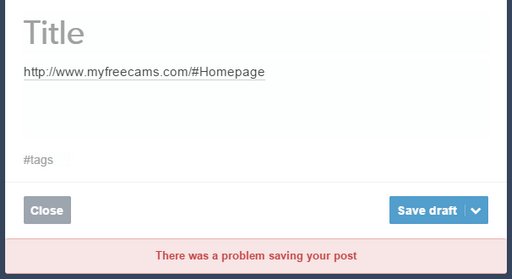
Although I was initially able to save more than one draft posts with the Extra Lunch Money and Clipvia links, subsequent attempts failed:


From there, I moved on to creating new “photo”-type posts. I would upload an image (the same in all cases), paste in the test URL, and attempt to save. In this case, I have not been able to get the Extra Lunch Money link to fail; it’s worked several times when I have tried this experiment:

However, my other two test URLs are not postable:
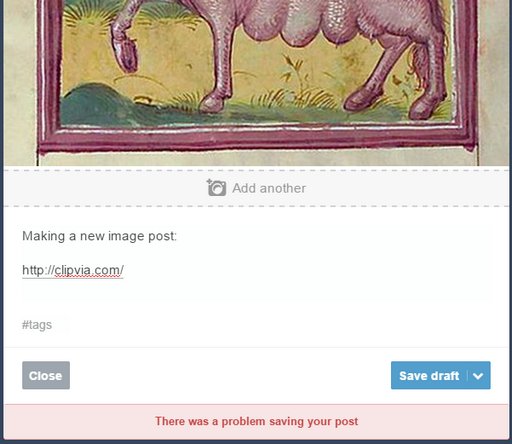

For my final experiment, I tried editing a post reblogged from someone else, and pasting in all three suspect links. In this, and several other experiments with reblogging, I was unable to generate the mysterious error message, and instead successfully saved my drafts:

My conclusion? If this is indeed a deliberate block of a set of blacklisted links, its implementation is glitchy, because the same link would sometimes post and sometimes fail to post for me. Its implementation is also glitchy across different post types and post actions. However, I don’t believe it’s completely random; there seem to be no reports of unpostable links outside this universe of sites used by camgirls and indy custom adult clips producers. I suspect that Tumblr does indeed have (and has had since at least 2013) a blacklist of not-to-be-published links. (This would even make sense if its use was restricted to protecting Tumblr users from malicious malware installers, to pick one obviously-legitimate use for a blacklist.) There might be an automated process (that’s gone wrong) for adding sites to the blacklist, or there might be a training-and-supervision issue that has let “rogue employees” add stinky adult sites to a list that was not intended for the restraint of adult publication. Given the way different attempts to post the same link have different results at different times, it’s even possible the blacklist is not universally distributed across all of Tumblr’s different server farms.
If enough Tumblr users report this “glitch” to Tumblr support, I expect that eventually the adult links they would like to publish will be removed from the blacklist, since the links do not violate any of Tumblr’s existing terms of service or community guidelines. That’s what Tumblr did last time, and they haven’t announced any new terms or policies (I checked).
Last time Tumblr was flirting with blocking selected adult links from publication, I wrote:
Tumblr is quietly and dishonestly hostile to adult content in general and to adult marketing and self-promotion in particular, even when that marketing complies with their community guidelines in every particular. Which is a nice intro to this morning’s sermon on The Catechism of Bacchus:
- Tumblr is, at the end of the day, a blogging service.
- As I’ve been saying since at least 2004, blogging services suck.
- This is Bacchus’s First Rule and it remains the rule: Anything worth doing on the internet is worth doing on your own server that you control.
- You will be tempted to ignore The Rule because of social media network effects.
- You may even feel forced to ignore it, because you can’t get enough attention on your own platform.
- When you disregard the rule (and everybody does, even me who wrote it) you will get burned.
- Count on it. Plan for it. The Pornocalypse Comes For Us All.
Nothing has changed since I wrote that.
Similar Sex Blogging:
Thursday, August 8th, 2013 -- by Bacchus
Reports are coming in that Tumblr has begun (or ramped up) a crackdown on people who use Tumblr for adult marketing in ways that seem consistent with Tumblr’s community guidelines. Remember, those guidelines say:
Don’t use deceptive means to generate revenue or traffic, or create blogs with the primary purpose of affiliate marketing. Spam doesn’t belong on Tumblr.
Now comes word (and I’ve confirmed it) that there’s at least one adult link that you simply are not allowed to type on Tumblr. (Actually, you can type it, but then your save/publish button won’t work…) A link to this appeared in my Twitter feed:
Post Yahoo acquisition we’ve had several Extra Lunch Money (ELM) related Tumblr blogs removed (with no explanation given) and we’ve heard from other websites and sellers who’ve had their Tumblr blogs taken down as well. While Tumblr has always removed blogs (which they are completely within the right to do), we’ve noticed something more troubling. Tumblr is censoring links to certain adult websites from being published. Which adult website? Namely, extralunchmoney(.)com.
Wait. What’s ExtraLunchMoney(.)com?
ELM is a marketplace for amateur models to sell their own hand made adult movies, pictures, and more. It’s like Etsy, but a LOT naughtier.
How are they censoring ExtraLunchMoney(.)com?
If you try put in any link with “extralunchmoney(.)com” Tumblr will not allow you to save the post so you can publish it. Instead it will say “There was a problem saving your post” which is Tumblr speak for you’re not allowed to link to this website.
Even worse, you can’t even type out the word “extralunchmoney(.)com” in a post without using parentheses. You’ll get the same “There was a problem saving your post” message.
Go ahead and try for yourself.
So I did. I created a brand new Tumblr blog and, as the very first post, I tried to save this:
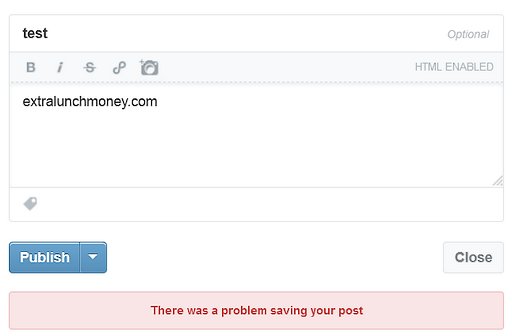
Wow. So then I changed the “n” to an “r”. Extralurchmoney.com (the place to buy and sell your zombie-themed goods?) saves just fine on Tumblr.
Back to the report:
It’s also not limited to posts. If you want to update your blog side bar to say for example “I help run this site called extralunchmoney(.)com” you’ll get this “error” (lie): “Your settings may not be valid…”
If you take out the reference to the link then magically everything works ok again. Rather than specifically saying “Sorry, you can’t post links to that site”, they present the problem as a vague technical issue…when in fact it’s CLEARLY an issue with the domain name. But, from the looks of it, Tumblr wants to hide that fact.
Why are they blocking ExtraLunchMoney(.)com?
We’re not 100% sure, but it’s probably due to the adult nature of ELM (Tumblr if you’re reading this and we’re wrong, please let us know). The end result being thousands of ELM sellers and supporters being restricted from freely posting what they want to their Tumblr blogs. Which somehow seems like the opposite of valuing “creative expression.”
ELM does not have an affiliate program, and nothing in Tumblr’s community guidelines prohibits self-promotion or adult promotion as long as it’s neither deceptive, nor spam. Of course Tumblr does not define what it means by those terms, but nonetheless, I think it’s fair to say that a sneaky and dishonest blanket ban on publishing a specific adult URL is consistent with Tumblr’s methods. Beginning during the negotiation of the sale to Yahoo, Tumblr’s practice has been to disadvantage its adult content in silent and hard-to-notice ways, even when that content was fully-consistent with its fairly permissive community guidelines. What’s more, when forced to backtrack by public outrage after the big robots.txt debacle, Tumblr went to great lengths to pretend it was all a misunderstood and unfortunate technical error.
So my prediction here is that if the link-censoring initiative attracts enough negative attention, publishing these links will start working again and Tumblr will either say nothing, or explain that it was all just a glitch. But if this story doesn’t reach critical mass, look for the list of disfavored adult links to continue to grow.
I am also hearing reports that Tumblr is more aggressively deleting blogs that are being used for adult promotion, even when that promotion seems consistent with the community guidelines. In addition to the mention in the blockquote above of “we’ve had several Extra Lunch Money (ELM) related Tumblr blogs removed”, there are similar reports from the world of camgirls:
As of this morning, my tumblr – hellenlefay.tumblr.com – no longer exists. One minute it was there, the next it wasn’t. I tried opening the dashboard and it said my blog had been terminated, and I could contact support if I didn’t know why this happened.
Um, of course I had no idea why this happened! If you’ve ever stumbled onto my tumblr, it’s very obvious I’ve put quite a bit of time into the design and content. I wouldn’t intentionally do anything that would get me removed! In the recent past I updated my blog to be listed as NSFW, even though I only post pg13 pictures, just in case I was reported for being considered adult content but not listed as such.
So, why was I terminated? Not warned, not suspended, but my entire account deleted?
Spam and affiliate marketing.
This is the reply I received from Mathieu inTumblr Support:
We’ve terminated your Tumblr account at hellenlefay.tumblr.com for spam or affiliate marketing. Per the policies you agreed to when creating your account, Tumblr prohibits such activity.
Don’t put deceptive links or dubious code in your posts. That includes using Javascript to inject unwanted ads in blogs, or embedding links to interstitial or pop-up ad services. Don’t use deceptive means to generate revenue or traffic, or create blogs with the primary purpose of affiliate marketing.
Let’s break that down to address each point. First off, I typically post 1-5 posts per day, so that’s hardly spam. It can’t even be argued that I’m spamming other people through their Ask or Fanmail boxes, because I rarely use them. Or mine. As for affiliate marketing, that is not something I’ve ever gotten into. I truly admire the girls who put the effort into running a successful affiliate system, but really really really I can’t, so no affiliate marketing on my Tumblr.
Deceptive links or dubious code – anything I’ve ever posted has been extremely obvious about where the link goes. For example, if it says “Clips4Sale”, guess what? It links to c4s.com/53691, which is my Clips4Sale page. Shocker! The only sort-of-sneaky code I had done was when I put in endless scrolling and disabled right-clicking on my photos. ;) The last point, about using deceptive means to generate traffic, really threw me… I guess showing my butt is a deceptive way to increase traffic?
The main purpose of my tumblr was promotion – I posted photos of myself and links to my websites. My posts were PG13. I was tagged as NSFW as a precaution, because hey, I have some hot friends who post some very hot photos, and I like to reblog them once in a while. I linked to my profiles on other sites, both on my tumblr blog and in my posts.
My entire account was terminated without warning or suspension.
This isn’t just happening to me, it’s also happened to a couple of my camgirl friends. They were terminated without warning as well.
If you’re a camgirl (or really any adult industry person), be aware that tumblr can and will remove your entire account if they don’t like what you post or where your links go.
This, too, is not new. Tumblr has a long and unsavory history of deleting adult blogs (and for all I know, non-adult ones) it deems too commercial, even if they don’t violate the community guidelines. The best explanation I’ve got for that is that they’ve got an extremely broad and flexible definition of spam. Which, if they’d be explicit about it instead of sheepish and deceptive and piously “we value your freedom of expression”, would be no problem at all.
But they’re not. They are quietly and dishonestly hostile to adult content in general and to adult marketing and self-promotion in particular, even when that marketing complies with their community guidelines in every particular. Which is a nice intro to this morning’s sermon on The Catechism of Bacchus:
- Tumblr is, at the end of the day, a blogging service.
- As I’ve been saying since at least 2004, blogging services suck.
- This is Bacchus’s First Rule and it remains the rule: Anything worth doing on the internet is worth doing on your own server that you control.
- You will be tempted to ignore The Rule because of social media network effects.
- You may even feel forced to ignore it, because you can’t get enough attention on your own platform.
- When you disregard the rule (and everybody does, even me who wrote it) you will get burned.
- Count on it. Plan for it. The Pornocalypse Comes For Us All.
Update, some hours later: The “extralunchmoney.com” string can now be published on Tumblr without a problem, or it could when I just tested it. I do not believe it was a glitch but if Tumblr ever acknowledges this trial balloon, I’ll betcha they claim it was.
Updated update: It’s official, Tumblr support said it was a glitch. As I predicted. “Looks like a glitch on our end was causing the problem, but now it’s fixed.” Pretty strange “glitch”, though. My guess is that they’ve got a shit-list of unpublishable URLs, which are supposed to be genuine bad actors. This would make sense, to stop a malware link that’s going viral for instance. The “glitch” here would be that a legitimate URL got put on the list, I’m guessing. If they are ramping up enforcement of affiliate spam and somebody got overzealous or had poor training, it would explain this outcome. That would also explain why the camgirl sites are getting slammed; those links they use to direct people to their camming sites look a lot like affiliate links in structure, even though they aren’t actually affiliate links in function.
Similar Sex Blogging:
Saturday, July 20th, 2013 -- by Bacchus
It’s time to be very clear about the words “NSFW” and “Adult” in the Tumblr context. They mean different things. Until recently, users were faced with two self-flagging options. This is the relevant screenshot from my May 15 post:
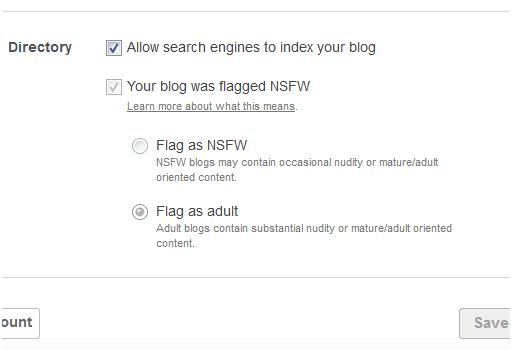
Here’s how Tumblr’s page on Understanding NSFW and Adult Blogs explained the difference, then and now:
Please respect the choices of people in our community and flag your blog as NSFW or Adult from your blog Settings page.
- NSFW blogs contain occasional nudity or mature/adult-oriented content.
- Adult blogs contain substantial nudity or mature/adult-oriented content.
Note what’s not present (this will be important later). There’s nothing there about commercial porn sites or affiliate links. The difference between NSFW and Adult is the extent of nudity or “mature/adult-oriented” content. If it’s occasional, your blog should be flagged NSFW; if it’s “substantial”, your blog should be flagged Adult. When we talk about “porn on Tumblr” everybody is talking about Tumblrs that should be flagged Adult. We’re talking about the blogs that are all porn, all the time, the raunchier the better. Accept no substitutes!
So, that’s the Tumblr policy as it’s been for at least the last several months. I am going into this so carefully because Tumblr has been (IMO deliberately) using these words to deflect inquiries and confuse the press. Ask Tumblr about porn or Adult-flagged blogs and they will come back with a phrase about NSFW blogs. The questioner may think he or she just got an answer, but in reality he got a load of bullshit about something else. Everybody needs to watch out for this going forward, if only so you can avoid all the incoherent tech press articles by reporters who never understood that this distinction exists and who (typically and somewhat reasonably) think “Adult” and “NSFW” are plain-language synonyms as they normally are.
OK, that’s the history. What’s the news?
Yesterday, at some time after I posted about the plain falsehoods in that press email from the Tumblr Head of Communications Katherine Barna, Tumblr founder David Karp posted this article to the Tumblr Staff blog, which is “The official feed from the people behind Tumblr.” Karp’s post suggests that changes are coming, and that’s reinforced by a new yellow-highlighted “This Page is out of date and is in the process of being updated” legend on the Understanding NSFW and Adult Blogs page. (That’s the one that just got updated on Thursday when Tumblr started admitting they were excluding Adult blogs from their internal search indexing. Yup, now it’s “out of date”.)
So what’s the awesome new Tumblr plan to reassure us all that Tumblr has heard our feedback? Well, it looks like the new plan is to hide all the seach-banned Adult-flagged blogs from the interface, deploy a new set of vilifying lies about these now-even-harder-to-find blogs, and carry on talking about the NSFW category only. Possibly I’m uncharitable. So let’s look at Karp’s post together, shall we?
It begins:
All, we’ve heard from a bunch of you who are concerned about Tumblr censoring NSFW/adult content. While there seems to be a lot of misinformation flying around, most of the confusion seems to stem from our complicated flagging/filtering features.
It opens like a classic corporate non-apology backtrack. “We hear you, it’s a damned shame you’ve all fallen for the terrible misinformation that’s flying around, however we are complicated which may have prevented you from understanding how awesome we are.” Note the “NSFW/adult” terms being used together in this nonspecific way. Moving on:
Let me clear up (and fix) a few things:
1. Last year, we added “Safe Mode” which lets you filter out NSFW content from tag and search pages. This is enabled by default for new users and can be toggled in your Dashboard Settings.
Here he’s using “NSFW” to mean both “NSFW” and “Adult”. Of course the Safe Mode applied to both NSFW and Adult-flagged blogs (once the Adult category was added) and it filtered them both out by default.
As some of you have pointed out, disabling Safe Mode still wasn’t allowing search results from all blogs to appear. This has been fixed.
This appears to be another flat lie. It may well be true of blogs with the NSFW tag, but Karp says “all blogs” here, and I can show you how to disprove that. Remember, Tumblr’s own little check-box chart says that NSFW blogs are indexed by Tumblr search and Adult ones are not. If they’re not indexed, how can they hope to show up when a user turns off Safe Mode? Now, watch me prove it, using a recent post on Fifi’s wonderful Feeling Is First Tumblr. Is it flagged as Adult? Yes it is; you have only to navigate to http://feeling-is-first.tumblr.com/robots.txt to see the deadly disallow-all instruction.
So, Fifi posted this yesterday (Friday, July 19th) and she tagged it #phonograph:

So, Feeling Is First is a Tumblr blog, and David Karp says that turning off the default Safe Mode in your Tumblr account “wasn’t allowing search results from all blogs to appear” but has been fixed. Well, was it actually fixed? See for yourself. Log into your Tumblr dashboard, check that you’re not in Safe Mode, and type “phonograph” into the search box. As I write this, the search is returning precisely two results from yesterday for the “phonograph” tag and neither of them is Fifi’s post.
A Karp apologist might remind us that Tumblr isn’t indexing Adult-flagged blogs, so there are no search results from these blogs to appear; they weren’t being blocked by Safe Mode, they just don’t exist. My response to that would be, it tortures the language beyond its limits. You can’t brag about enabling “search results from all blogs to appear” while chortling behind your hand about an entire class of porn blogs for which you aren’t generating search results. Especially not in a post about a controversy over disappearing porn blogs.
Karp goes on:
Some search terms are blocked (returning no results) in some of our mobile apps. Unfortunately, different app environments have different requirements that we do our best to adhere to. The reason you see innocent tags like #gay being blocked on certain platforms is that they are still frequently returning adult content which our entire app was close to being banned for. The solution is more intelligent filtering which our team is working diligently on. We’ll get there soon. In the meantime, you can browse #lgbtq – which is moderated by our community editors – in all of Tumblr’s mobile apps. You can also see unfiltered search results on tumblr.com using your mobile web browser.
There’s another whole blog post to be done on how Apple’s anti-porn apps market is chilling adult discourse on the modern internet, but that’s for another day. Let’s focus on Karp’s last sentence here: “You can also see unfiltered search results on tumblr.com using your mobile web browser.” Yesterday I called out Tumblr Head of Communications Katherine Barna for lying when she said “Users can also find all content with Tumblr search in their mobile web browser.” Karp has cleaned this up to the extent of replacing “all content” with “unfiltered search results”. Since Tumblr says it is not indexing Adult-flagged blogs, there are no search results from them to include in unfiltered results. So Karp avoids the direct lie here. But the deception remains. Karp doesn’t get to brag about “unfiltered search results” while excluding an entire class of supposedly-welcome blogs from search indexing.
But now we get to the truly-astonishing “demonize, vilify, and disappear” discussion where Karp acknowledges the genuinely Adult-flagged blogs for the first time:
Earlier this year, in an effort to discourage some not-so-nice people from using Tumblr as free hosting for spammy commercial porn sites, we started delisting this tiny subset of blogs from search engines like Google. This was never intended to be an opt-in flag, but for some reason could be enabled after checking off NSFW → Adult in your blog settings. This was confusing and unnecessary, so we’ve dropped the extra option. If your blog contains anything too sexy for the average workplace, simply check “Flag this blog as NSFW” so people in Safe Mode can avoid it. Your blog will still be promoted in third-party search engines.
Here is the genuine bad news for Adult bloggers on Tumblr. According to the soon-to-be-revised policy, the Adult-flagged blogs were formerly a perfectly-welcome part of the Tumblr community, and porn bloggers on Tumblr were asked to voluntarily flag as such if they posted “substantial” nudity. Now Tumblr is claiming this was all an accident and they are burying the Adult-flagged blogs behind an additional barrier of invisibility. They’ve removed the radio button (that somehow accidentally wrote itself into the interface) for Adult blogs and they will only use an NSFW flag going forward. In the interface, Adult-flagged blogs will no longer exist. You’ll be NSFW or nothing — and, Karp promises, NSFW blogs will (continue to be) visible to the search engines.
So, what about those gazillions of porn bloggers already on Tumblr? You know, the ones this controversy is actually about? The ones Karp now newly claims were “a tiny subset” of “not so nice people” “using Tumblr as free hosting for spammy commercial porn sites”? What’s going to happen to them?
Let’s be clear about the fast one Karp is trying to pull here. Tumblr’s community guidelines have long prohibited the creation of blogs that were “for the primary purpose of affiliate marketing.” If caught, the penalty for this (according to some threads I’ve perused on adult webmaster forums) was deletion of the offending blog. At first, Tumblr’s enforcement was lax; but as abuses piled up, they went through a period where they were deleting blogs that had just a single affiliate link. So Karp is lying when he claims that the Adult flag was only intended for “spammy commercial porn sites”. The defining characteristic was “substantial nudity”, not commercial spam. The affiliate spammers were a whole different problem with an entirely different and more draconian solution. Karp knows this. This is not a failure to communicate. This is deliberate deception aimed at marginalizing Tumblr’s porn bloggers and justifying that marginalization.
So what’s going on? Karp has gone out of his way to demonize the blogs that were flagged as Adult. That suggests to me that we won’t be seeing an “all is forgiven” removal of the search engine exclusion for formerly Adult-flagged blogs that are now (by the new definition) merely NSFW. Instead, it looks like the blogs already flagged as “Adult” will stay that way, only now the very existence of the “Adult” category will be invisible in the interface. And anybody who complains? They’re just “not so nice people” trying to scam Tumblr out of free hosting for their commercial spam.
If Karp were honestly trying to fix this, he’d have announced that the search engine blocks for blogs with substantial nudity were being removed. He didn’t say anything of the sort. Instead, he lied, and claimed that they were only supposed to be applied to spammers in the first place. But his own soon-to-be-revised policy documents show the lie; they show that the Adult flag and the search engine exclusion were intended for everyone showing substantial nudity. That’s the history Tumblr is now trying to sweep under the rug. Tumblr has buried its porn blogs, and now it’s trying to scratch dirt over the evidence with its rear claws.
Karp goes on:
Aside from these fixes, there haven’t been any recent changes to Tumblr’s treatment of NSFW content, and our view on the topic hasn’t changed.
Here he uses the NSFW word (and that “recent”) to ignore the actual controversy, which is over the search limitations on Adult (not “NSFW”) blogs that were implemented several months ago. He closes with some happy boilerplate:
Empowering your creative expression is the most important thing in the world to us. Making sure people aren’t surprised by content they find offensive is also incredibly important and we are always working to put more control in your hands.
Sorry for all of the confusion. If you have any more concerns or suggestions on how we can make these features clearer or more useful, please email us!
My predictions for the future:
- When the “in the process of being updated” Understanding NSFW and Adult Blogs page gets updated, all references to the former “adult” category will be gone. No search blocking (internal or external) will be disclosed on the page.
- The millions of currently Adult-flagged blogs (the ones that have “substantial nudity”) will still have the no-longer-visible-in-the-interface Adult flag, they will still have a robots.txt block in place, and they still won’t show in Tumblr’s internal searches.
- Tumblr’s porn blog community will be invisible and unacknowledged. The suits will call this “winning”.
There is another possibility. The correct thing for Tumblr to do (if they were sincere about replacing the dual system with a single, simpler, NSFW flag) would be to reflag all the Adult-flagged blogs as NSFW. But if they were going to do that, would Karp have lied about the reason the Adult flag was implemented? I do not think so.
Somebody on Reddit said it best, yesterday: “So passes Tumblr, son of Geocities, and cousin to Digg. May it rest in cache.”
Except, of course, that the good stuff won’t be in anybody’s cache, because of robots.txt…
UPDATE: Wow, that was fast. In just three hours, the first of my predictions has already come true: the Understanding NSFW and Adult Blogs page has been updated and it looks just like I thought it would. No charts, no checkboxes, no more “adult” category, it’s all NSFW and there’s no mention of anything being excluded from search engines.
However, it looks like I missed the mark on my other two predictions (time will tell). I’m getting preliminary reports in my comments (and my own random tests agree) that the hated robots.txt is vanishing from many or most of the formerly-hidden Adult-flagged blogs. Karp still deserves censure for telling a big hairy lie about the history and reason for the Adult-flagged groups (and for attempting to deceive the world into thinking these were principally self-flagged by accident rather than auto-flagged by Tumblr) but perhaps the reason for the deception was to avoid the perception of a back-track, rather than to conceal the deeper burying of adult blogs that I feared was coming. But if the robots.txt files that are going away stay gone, this is actually a huge win for adult content on Tumblr.
Similar Sex Blogging:
Friday, July 19th, 2013 -- by Bacchus
I was among the first to discover back on May 15 that Tumblr was using an exclusionary robots.txt file to hide the contents of blogs flagged “Adult” from all search engines, the Internet Archive crawler, and any other internet service that respects robots.txt files. A few days later when I was poking at that unpleasant fact, I also discovered that Tumblr was excluding these blogs from its internal tag-search function:
Worse yet? Tumblr blogs flagged “adult” aren’t searchable even with Tumblr’s own internal search. You can test this yourself. Log into your Tumblr dashboard, go to your settings, and make sure you haven’t checked the “Browse tag pages in Safe Mode (Hide content from NSFW blogs)” setting:
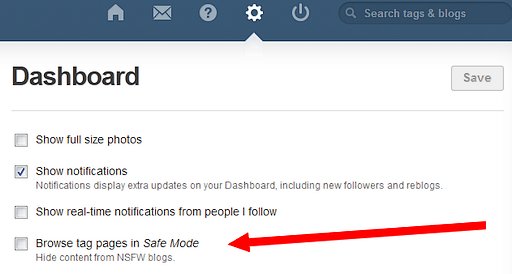
Unlike the one that doesn’t actually “allow search engines to index your blog”, this checkbox appears to actually work in the narrow sense that if it is not checked, you can search for blogs flagged “NSWF” within the Tumblr tag search interface. But this checkbox lies by omission. You’ve got the option to search tag pages of NSFW blogs (or not) but opting to search them does not let you search blogs that have the deeper-level-of-perdition “adult” flag.
I even proved it with a careful set of screenshots:
My test for this is to search for a recent post at Wicked Knickers, which I used as my “adult” flagged example in the Thou Shalt Not Search Adult Tumblr Blogs post:

The post we will be looking for in the Tumblr dashboard tag search has a time stamp of 9:30pm yesterday, May 18, and is tagged “ziegfeld” which makes it a nice handy and recent thing to search for.

So, what happens in the Tumblr tag search interface? If you’re logged in, this is what you see when you search for tumblr posts with the “ziegfeld” tag. The posts returned are listed in date order (most recent first) and dates are visible as tooltips on the live page, so I’ve added them in the margin with red arrows and white text. You’ll see that the Wicked Knickers post is not returned by the Tumblr search:

Thus you can imagine my surprise when Twitter started blowing up yesterday with outraged Tumblr-users who had only just discovered that their adult blogs had gone missing (2-3 months ago) from the Tumblr tag search interface. Of course it was all over Tumblr as well. I didn’t pay it any mind; I was busy yesterday and figured it was just one of those moments when public consciousness crystallizes about a long-established injustice.
It wasn’t until this morning, when I finally had time to get caught up, that I discovered what had caused the moment of crystallization. At first I thought it was the Daily Dot article that appeared yesterday, which I only skimmed at the time due to it being such ancient news to me: New NSFW content restrictions enrage Tumblr users. But then this morning Violet Blue published a similar (but much better, and I’d say that even if she hadn’t quoted my May reportage in detail) article at ZDNet: Adult Tumblr blogs now removed from every form of search possible. Violet’s too good a reporter to jump on a bandwagon just because it’s starting to speed up, so I took a second look at both articles to see what, if anything, had actually happened recently and wasn’t old news. Finally I twigged to it. Although the Tumblr internal search (which has always been a tags-only search) hasn’t revealed content from blogs flagged “adult” for months, the “new thing” is that Tumblr’s cryptic little internal checklist has finally (yesterday? Nobody seems to know just when) been updated to reveal that fact. Here’s the box as it existed on May 15, with my red arrow:

And here’s the box as it is today, which Violet linked to and the Daily Dot printed:

I’ve outlined what’s actually new in the graphic. Once again, it isn’t new policy at Tumblr; these are the rules since (near as I can tell) some time in February. What’s new is that Tumblr is now admitting what the rules have been for some time.
Now we come to the happy fun-time “evasions and denials” section of this post!
Remember, first, that Tumblr’s internal search has always been a tags-and-titles-only affair. So, look again at that line in the first red box of mine: “Posts appear in tag pages and search pages for logged-out users.” They are playing games with multiple pairs of yes-no variables here, for maximum confusion. The one checked box is for unflagged blogs; the unstated obverse is that “posts on flagged Adult and NSFW blogs do not appear for logged-out users”. Fair enough so far. What does the statement “do not appear for logged-out users” imply? Well, it implies that the posts do appear for logged-in users, which would make this a fairly benign (if still nanny-ish) attempt to make sure everybody who sees porn has opted-in to see it.
But that benign implication is false. Remember the other new (red boxed) line in the graphic? It says “Blog indexed by Tumblr search” and shows an unchecked box under “Adult”. So, in the first red box they say “you can’t see adult adult or NSFW blogs when logged out”, implying that logged in users can see them. But then in the second red box they carve the adult ones away, because they admit that Tumblr search (which is tag search) won’t index these blogs at all, meaning that logged-in users won’t see them either. NOBODY WILL SEE THEM except your logged-in followers, and that appears to mean legacy followers only, because how would anybody not already a follower of an adult-flagged blog ever discover it now? If your blog is flagged adult on Tumblr, you’re blogging inside a sealed black box, and you have been for months.
So much for evasion — now for the outright false denials. The reporters for the Daily Dot sought comment from Tumblr, and they got this from Tumblr Head of Communications Katherine Barna. I’m including my commentary inline [in italicized brackets like this]:
Tumblr’s longstanding policy regarding NSFW content has not changed [true, if a few months is “longstanding”] and emphasizes the importance of free expression. [Bullshit!] As addressed in these policies, we are constantly taking measures to ensure our users can avoid this content [true so far] unless they’d like to see it. [A lie — if they’d like to see it, they still can’t find it because Tumblr doesn’t index it.] You can read about some of these features here: http://www.tumblr.com/docs/en/nsfw
Adult and NSFW content will be visible to anyone who has opted-in via their Settings page. [“Visible” only if you know the link already, but not searchable for anyone. In other words, more bullshit. Unless the “will be” future phrasing means Tumblr plans to change this? Do not die holding your breath.]
Different app environments have different requirements that we do our best to adhere to. [Presumably true, but freighted with the false implication that this is why Tumblr restricts adult content in its apps, given that they restrict it elsewhere likewise] Users can also find all content with Tumblr search in their mobile web browser. [Flat lie. Tumblr’s own policy chart newly shows that Tumblr search does not index the adult-flagged blogs.]
So, there you have it, folks! Months after making a policy change to exclude adult-flagged blogs from its internal search, Tumblr updates its docs to disclose the change. Internet goes wild, so their spokeswoman sends email that contradicts the new policy document and falsely denies the change.
Similar Sex Blogging:
Saturday, June 1st, 2013 -- by Bacchus
Lots of people (including me) started bitching after I discovered that Tumblr was locking away all the adult blogs behind a robots.txt designed to make them impossible to search or archive. Dr. Faustus has actually been doing something constructive about it, by exporting the best images from his Tumblr to individual self-hosted blog posts and this very fine thumbnail gallery. He explains his motives thusly:
In May 2013 Tumblr was acquired by Yahoo, a major corporation with at best a checkered record for dealing with its acquisitions.  While Yahoo executives insist that they’re not going to screw up Tumblr, their past record combined with their obvious interest in having the site generate more corporate advertising revenue off the site makes me profoundly pessimistic about its future, especially with respect to adult content. And my pessimism is shared by some of the most astute and experienced observers in the adult Internet world. I fear the coming of a day when my tumblr is simply deleted for its violation of some vague “community standard,” which deletion will take place without warning or possibility of appeal. The content that I will have worked so hard to curate will be lost. I am determined to have it not be lost, and that is why I am keeping it here on my own site that I control. While Yahoo executives insist that they’re not going to screw up Tumblr, their past record combined with their obvious interest in having the site generate more corporate advertising revenue off the site makes me profoundly pessimistic about its future, especially with respect to adult content. And my pessimism is shared by some of the most astute and experienced observers in the adult Internet world. I fear the coming of a day when my tumblr is simply deleted for its violation of some vague “community standard,” which deletion will take place without warning or possibility of appeal. The content that I will have worked so hard to curate will be lost. I am determined to have it not be lost, and that is why I am keeping it here on my own site that I control.
Even if this ugly day never comes, there is still a major problem with Tumblr, which is that its content is simply not searchable. Tumblr blocks access to the crawlers of search engines and the Internet archive, probably to make itself more appealing to the corporate suits who are now its overlords. To me, that is not the Internet. The Internet means openness. It means having content that people who want to find can find. And it means backups for the historical record.
I will not stand to see the content I have curated hidden – tucked away as if it were something shameful – any more than I can stand to see it lost. I intend to save at least some of it, and that is the purpose of both my “Tumblr favorites” blogging and of this thumbnail index gallery.
Similar Sex Blogging:
Friday, May 24th, 2013 -- by Bacchus
I was noticing a quite a bit of extra traffic in my stats yesterday and when I tracked it to the source out of curiousity, it turns out that my recent Tumblr posts were featured in a very nice article on Metafilter:
The Digital Equivalent Of Stashing A Dirty Magazine Under Your Mattress
I don’t think ErosBlog has ever made Metafilter before, except in the comments. This time, the thread-winning comment for me is:
The robots.txt standard is not the problem; the problem is that your stuff is on a site where somebody else controls the robots.txt file.
Similar Sex Blogging:
Monday, May 20th, 2013 -- by Bacchus
As promised in my last post, this is the post in which I tell you how to make a full and complete backup of your porn Tumblr blog (or, really, any Tumblr). My goal for you is a set of files on your own hard drive that contains all the text and all the links and all the pictures (even the full-sized high-res click through ones) that you’ve got on your current Tumblr blog, all linked together in a way that you can open the site in your browser and browse through it just like you would online. This can be done. It’s not even very hard. And once you’ve got it done, you’ll have all the raw material you would need re-create your tumblr blog on some other hosting, if anything should happen to Tumblr or to your porn blog on Tumblr.
But why should you worry about that? Why might you need a Tumblr backup?
Well, as I write this, the news is official: Yahoo has purchased Tumblr for more than a billion dollars, cash. (Tumblr shareholders did not want any stinky Yahoo stock, which should tell you something.) The business press has been pointing out for awhile that Yahoo will need to deal with what the suits in the corporate/financial/advertising world consider to be Tumblr’s “porn problem“. And Yahoo itself has a terrible reputation for buying cool, trendy, successful websites, running them into the ground or neglecting them to death, and then shuttering them. (Remember Geocities? Shaddup, it was cool once. A long time ago…) As Violet Blue puts it in her Sex Tech column at ZDNet:
Yahoo! is well-known for misunderstanding the user base of properties it acquires and ruining – then scrapping – once-active and beloved properties.
…
But if Flickr’s rep [under Yahoo’s ownership] with poorly policing ‘art nudes’ is any hint of Tumblr’s fate, then we’re likely to see lots of once-happy users forced into confusing self-rating protocols, having their accounts banned and years of content deleted with no recourse, and a new content policy practically written by trolls who want the easiest path to shut down people they don’t like.
I, myself, have been speculating for a couple of weeks that Tumblr would soon start cracking down on its “porn problem”, starting with an idle prediction in my The Pornocalypse Comes For Us All post and expanding on it when I discovered (apparently before pretty much anybody else noticed) that Tumblr had started trying to hide all the porn blogs from Google. At first the specific reason was not clear, but in the last few days the drumbeat of anticipatory news about the Yahoo purchase began to make the pieces fall into place. It’s safe to speculate that Tumblr began trying to minimize its “porn problem” while the sale was being negotiated, and there’s a strong basis for concern that (swiftly or eventually) Yahoo will continue that process and attempt to rid the Tumblr ecosystem of porn blogs. Even if they don’t, their track record of failure with acquisitions is such that there’s a good chance that all of Tumblr will have failed or shut down within a few years. And, for people who aren’t following Bacchus’s First Law of The Internet, backups are really important.
Enough nattering. You want tools and instructions.
I’m going to show you two ways to do this, a best-but-somewhat-complex way and an easy-but-somewhat-incomplete way.
Complete Tumblr Backup Solution:
First, the good way, the one recommended by my friend and prolific Tumblr-user Dr. Faustus. I’ve tested this and it works. When you’re done, you’ll have a complete copy of your Tumblr site on your own hard drive that you could navigate with your internet unplugged.
The program you want is: HTTrack/WinHTTrack Website Copier. It’s an open-source free-software general utility for copying and mirroring websites, available for most current versions of Windows as well as for a wide variety of Linux/Unix flavors. The Windows version presents a fairly old-fashioned interface with a bunch of cryptic options, but most of them come pre-set with sensible defaults that you actually don’t need to mess with. Plus, there’s good documentation. (Note well: there are many other programs out there that can accomplish this job. I’m recommending this one because it works and because I’m aware of it; I’m not claiming it’s the best or the easiest.)
Download the software and install it, then run it. You’ll be presented with a welcome screen where you need to click “Next”. Then, this screen:

The arrows show you the two fields that need your attention. All you really need to do is give this backup project a name and tell the software where to save the backup. Then hit “Next”:
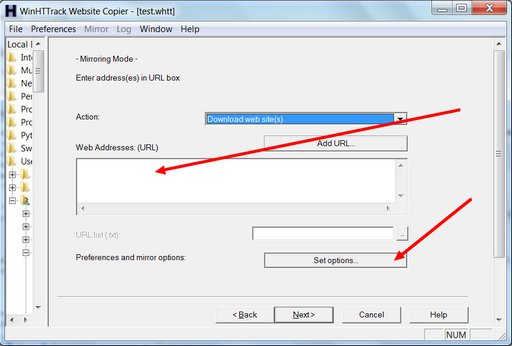
On this screen you need to type in the URL for the Tumblr you want to back up. It will be something like: http://yourtumblr.tumblr.com — and there’s one vital reason you need to press the “Set options” button. When you do, you’ll see this:

I’ve pointed arrows at three optional settings tabs that you may want to adjust, and at the one mandatory options tab where you must change a setting. I’m going to ignore the optional ones for now, except to say that you would tinker with these if you wanted to change the sorts of media files you’re saving beyond the basic .gif, .jpg, and .png (you’d need to do this if you were saving a Tumblr that had .wav files or .zip files or .mp3s), or if you need to limit this program from slamming your internet connection too hard. It’s the mandatory “Spider” tab you really need to click:

See the box where it says “follow robots.txt rules”? That robots.txt they’re talking about is the very same unwelcome bugger that got us into this mess in the first place. As a general proposition, one should usually instruct one’s electronic robot spider minions to follow robots.txt rules; unruly robot spiders are a menace to the internet and to web servers everywhere. But this principle of polite internet behavior assumes that you haven’t had your own data locked behind the hostile barbed wire of some corporate data-silo forced-labor camp where the robots.txt has been put in place to hide your porny visage so that the corporate camp commissars will look prettier in the pages of Forbes Magazine and the Wall Street Journal. When it’s your data, you’re perfectly within your moral rights to ignore the robots.txt in order to extricate it; and so that’s what we’re going to do here. Change it using the drop-down menu to say “no robots.txt rules”.

Yay! We’re almost done. Hit the “OK” button, hit “Next”, hit “Finish”, and your site copying should begin.
How long it will take to finish depends on the available bandwidth of your net connection, the memory and processing speed of your computer, and on whether you tweaked any of the options that control things like how many simultaneous connections your computer is making and how many files it’s trying to download in parallel. It also depends on how many pages there are on the Tumblr blog you are backing up, and on how big the images are. The default settings seem to be fairly gentle about not maxing out your internet connection or putting an unruly amount of strain on the server at the site you are trying to copy. Using default settings and a fairly crappy internet connection, I downloaded a test adult Tumblr blog (with permission of the blogger) in about two hours, that had roughly a thousand posts and took up about three-quarters of a gigabyte of room on my hard drive. Your mileage may, and probably will, vary.
What does success look like? You’ll have a folder on your hard drive with the name you provided on the first options screen. If you open it, you will find many sub-folders, and much that may seem mysterious. You should also find a file called “index.html” — and if you click on it, it should open in a new browser window where you’ll be looking at your backed up Tumblr site, using nothing but the files on your hard drive.
What have we not accomplished? Well, you’ve made what should be a full and true copy, but it’s not a nice clean export in some standard format that you could use to easily import all your posts into another content management system or blogging tool. HTML files and related images are scattered through a system of directories and subdirectories that, while logical, may not be the simplest thing to work with. Using the data you’ve got, a clever computer person could generate an XHTML document (or something similar) that could be semi-automatically imported into (say) WordPress. But it would take parsing; it would take work. Figuring out how to take the copy you just made and turn it back into a non-Tumblr website is a solvable problem, but how easy or hard it might be to actually do it depends on your access to computer expertise and tools. For now, you’re safe in the knowledge that you’ve got all the posts you’ve made this past however-many years. You’ve got the images, you’ve got their metadata (any tags you set for them and any credits you may have reblogged or included) and you’ve got the clever things you said about them, all, safe on your hard drive.
Now would be a good time to back up your hard drive. I’m just sayin’.
Partial/Easier Tumblr Backup Solution:
Perhaps all the above is too involved or too complex for you. Or maybe you tried, and failed. For you, there’s a simple little web tool called Backup Jammy where you just type your desired URL into the box and press “Go”. That’s it. A single huge web page appears on your screen with all your Tumblr post content in a simplified format. Then you can use your browser’s “Save as web page” function to save it to your hard disk.
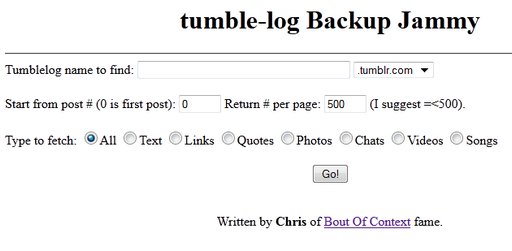
I don’t really recommend this tool. It doesn’t save nearly as much data as HTTrack/WinHTTrack does. In particular, all you seem to get is the standardized Tumblr 500-pixel versions of your images, and none of the higher-res versions that you may have posted. And if you have more posts than will fit in the memory of your computer at one time, you will have to do this in chunks, and save the chunks with appropriate names so you don’t overwrite one with another. It’s a less-complete solution. However, it’s also much easier, especially if your Tumblr blog only has a couple of hundred posts. And it might be enough for you. Certainly it’s better than nothing.
Conclusion
Given the existential threat that the adult Tumblr ecosystem is facing, I hope that smarter people than me will soon take some of the many fine website copying/mirroring tools that are out there, and meld them with friendly idiot-resistant interfaces and powerful parsing tools in a way that provides a seamless Tumblr export in a standardized format that’s ready for import into other blogging tools and posting on other social media platforms. I very much hope so, anyway. But that won’t happen today. A crufty backup you make today is worth a thousand times more than a perfect backup you never make before the platform goes down or is nerfed into uselessness or puts up filters to prevent the users from spidering their own content.
I’m painfully aware that the adult Tumblr backup solutions I’m offering here are messy, imperfect, and incomplete. All I can say in my defense is that they are the very best that I could find and test and describe and put up on the web in a single working day. For many of you, the Tumblr backup options listed here won’t be satisfactory or sufficient, and I apologize in advance for that. But if even a few of the great porn Tumblrs that went dark to public searching in the last few weeks are saved now and preserved on a hard drive and someday returned to the public web because of today’s effort, I’ll count it a day very well spent.
Similar Sex Blogging:
Sunday, May 19th, 2013 -- by Bacchus
The full implications of Tumblr making adult-flagged porn Tumblr blogs non-searchable, and hiding their content from the search engines, are only just starting to sink in for people.
For instance: if you have an adult tumblr, now you can’t even search your own blog to find an old post.
I’m getting panicky emails from people with huge adult Tumblrs, thousands of posts. Apparently internal Tumblr search has never worked well (you can search for one tag, or for blog names, but not for post content and there are no multi-keyword searches) and it’s impractical to scroll back very far in your own Tumblr dashboard. So they were in the habit of typing [keyword] [their own tmblr url] into Google, and hey presto! There would be the post they were looking for.
Now their blogs have a non-consensual robots.txt file that excludes Google, and all of those search results are gone from Google.
Worse yet? Tumblr blogs flagged “adult” aren’t searchable even with Tumblr’s own internal search. You can test this yourself. Log into your Tumblr dashboard, go to your settings, and make sure you haven’t checked the “Browse tag pages in Safe Mode (Hide content from NSFW blogs)” setting:

Unlike the one that doesn’t actually “allow search engines to index your blog”, this checkbox appears to actually work in the narrow sense that if it is not checked, you can search for blogs flagged “NSWF” within the Tumblr tag search interface. But this checkbox lies by omission. You’ve got the option to search tag pages of NSFW blogs (or not) but opting to search them does not let you search blogs that have the deeper-level-of-perdition “adult” flag.
My test for this is to search for a recent post at Wicked Knickers, which I used as my “adult” flagged example in the Thou Shalt Not Search Adult Tumblr Blogs post:

The post we will be looking for in the Tumblr dashboard tag search has a time stamp of 9:30pm yesterday, May 18, and is tagged “ziegfeld” which makes it a nice handy and recent thing to search for.

We already know that Google no longer has access to the posts on an adult-flagged Tumblr like this:
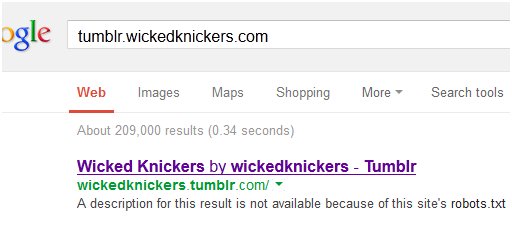
So, what happens in the Tumblr tag search interface? If you’re logged in, this is what you see when you search for tumblr posts with the “ziegfeld” tag. The posts returned are listed in date order (most recent first) and dates are visible as tooltips on the live page, so I’ve added them in the margin with red arrows and white text. You’ll see that the Wicked Knickers post is not returned by the Tumblr search:

Interestingly, that logged-in Tumblr dashboard search result is displayed at a URL ( http://www.tumblr.com/tagged/ziegfeld ) that returns something very different (but still no sign of our Wicked Knickers post) if you navigate to it as a not-logged-in person:

Try it yourself if you’ve got an adult-flagged Tumblr blog. Log in and try to search for your own posts in the search box on your own dashboard. You will, sadly, fail.
So, what is to be done? How can you search your own Tumblr blog?
The answer is, quite simply, you cannot — not while it’s on Tumblr’s server behind their robots.txt that you do not have the power to alter or remove.
But, all is not lost. Be ye not in despair. If you could only back up your adult Tumblr blog — make a complete copy of it, on your local hard drive — you could search it there with any file searching tool. Or, if you have a web server of your own, you could upload that copy (mirror it) onto your own web space, where it would once again be indexed and searched by Google.
That’s all I got. It’s the only way. It’s also a very good idea, because eventually The Pornocalypse Comes For Us All, and because Anything Worth Doing On The Internet Is Worth Doing At Your Own Domain That You Control.
Your next logical question is “But how do I do that? How do I back up a Tumblr blog?”
It’s not a simple question. The answer isn’t simple either. But, it can be done. So, that’s my next post.
Similar Sex Blogging:
Friday, May 17th, 2013 -- by Bacchus
As Tumblr users leave comments on my Thou Shalt Not Search Adult Tumblr Blogs post, it’s becoming clearer that the new robots.txt that prohibits search engines from indexing adult Tumblrs is quite new. But nobody seems to know precisely why Tumblr is newly trying to hide all its adult blogs, and Tumblr still hasn’t responded to my inquiry.
Well, here’s a Time report that Tumblr is in talks to be acquired by Yahoo for big bucks. A potential acquisition like that would certainly explain the urge to scratch kitty litter hastily over the porn that made your system big enough to sell in the first place:
Internet icon Yahoo! is in talks to buy New York-based social blogging platform Tumblr for as much as $1 billion, according to multiple reports. At that price, Tumblr would be pretty expensive, given that it reportedly only booked $13 million in revenue last year, but the deal could still make sense for Yahoo! That’s because Tumblr is extremely popular with the 18-to-24 year-old-set, precisely the demographic CEO Marissa Mayer is targeting as she attempts to turn the purple-hued Internet pioneer around following a multi-year slump.
It’s like I said in The Pornocalypse Comes For Us All:
But Tumblr is, famously, a popular platform in search of a revenue-generating business model. And we’ve learned that the suits have no loyalty to the porn users who made their platform popular. So, my bold prediction is that as Tumblr casts about for a business model, one of their steps will be to “clean this place up” (for the VCs, for the advertisers, for the potential buyers, for somebody). A lot more porn tumblrs will go away when that happens.
The pornocalypse comes for us all.
Note well: Yahoo itself is no friend to adult content. As early as 2001 Yahoo started hiding adult Yahoo Groups from its own directories and site search, making them very hard to find. And adult Yahoo Groups used to be (it’s been some years since I stopped paying attention) frequently deleted, seemingly at random and without any notice or hope of appeal, forcing the group members to reconstitute themselves on other services or in new, temporary, Yahoo groups. If Yahoo buys Tumblr, the adult Tumblr ecosystem is in for a rough ride.
Update:
According to sources close to the situation, the Yahoo board plans to meet Sunday night to decide whether to approve a $1.1 billion all-cash offer for New York-based blogging site Tumblr.
Update, via Violet Blue’s sex news:
If Yahoo Buys Tumblr, What Will It Do With All That Porn? (Businessweek)
Similar Sex Blogging:
Wednesday, May 15th, 2013 -- by Bacchus
If you’ve got an adult blog on Tumblr, there’s a good chance Tumblr uses robots.txt to exclude the search engines from indexing it. Did you know that?
Two weeks ago in The Pornocalypse Comes For Us All, I wrote:
Who is next? My guess would be Tumblr. Tumblr is, of all the big platforms, perhaps the most porn friendly; there’s lots of porn on there and the Terms of Service do not prohibit it… But Tumblr is, famously, a popular platform in search of a revenue-generating business model. And we’ve learned that the suits have no loyalty to the porn users who made their platform popular. So, my bold prediction is that as Tumblr casts about for a business model, one of their steps will be to “clean this place up”…
And now, guess what? I’ve discovered that Tumblr uses robots.txt to bar all search engine access to blogs flagged as adult. If you’ve got an adult Tumblr, go look at your own settings. Do you see that first checkbox, the one that says “allow search engines to index your blog”?

That checkbox is a lie. It’s nicely checked, it’s not greyed out, but if your blog is flagged “adult” it’s a lie. Do you see the “Learn more about what this means” link under “Your blog was flagged NSFW” selector? It leads to this page, where Tumblr requests users to appropriately self-flag their blogs:
Please respect the choices of people in our community and flag your blog as NSFW or Adult from your blog Settings page.
- NSFW blogs contain occasional nudity or mature/adult-oriented content.
- Adult blogs contain substantial nudity or mature/adult-oriented content.
If you’re not sure if you should flag your blog you can leave it unflagged, but keep in mind that we might flag it later if we see a lot of mature/adult-oriented content.
To answer the question “What happens to blogs that are flagged NSFW or Adult?” Tumblr offers this handy chart. The key piece of information is the white space indicated by my red superimposed arrow:

That’s right — where the “Blog indexed by Google” row intersects the “Adult Blogs” column, we find a ringing silence.
Would you have noticed? None of the adult Tumblr bloggers I know ever did. I knew from my porn researching that adult Tumblrs tended to be poorly represented in Google search results, but I chalked it up to the sheer scale of Tumblr and Google’s growing bias against returning porn search results. Nope, I found out the truth in one stark moment of astonishment, summed up by this image:
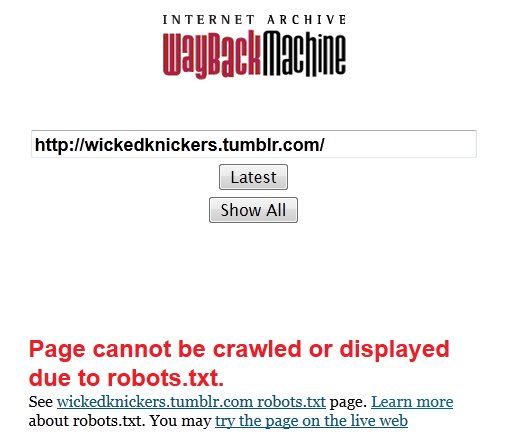
Let’s click the “See wickedknickers.tumblr.com robots.txt page” link:

From me: Aghast. Fucking. Gulp.
In robot, that means, roughly “All robots: stay out!” No search spiders allowed. No Internet Archive crawler. The Wicked Knickers tumblr is there, but you have to know about it, or you have to be linked to it. You won’t find it in Google, you won’t find it in any other search engine that honors robots.txt, and when Tumblr decides to stop hosting it, you won’t find the pages in the Wayback Machine — it will be gone for good, lost to humanity unless somebody with the technical chops and outlaw sensibilities of Archive Team finds a way to archive it anyway, robots.txt be damned.
Wicked Knickers is just an example, one that has some meaning to me because it’s one of the first Tumblr blogs I ever noticed, and I’ve been linking to it since 2010. That’s almost 6,000 vintage erotica posts since January 2009, and none of those pages are in Google or the Wayback Machine. It was only when I twigged to that anomaly that I finally understood what Tumblr is doing to adult blogs.
In all the years that I’ve been preaching Bacchus’s First Rule (“Anything worth doing on the internet is worth doing on your own domain that you control”), I’ll confess that I never considered the power of robots.txt, or what it means to be putting stuff on an internet site where somebody else controls what robots.txt says. Not only do they control your visibility to search engines, they control whether history will remember what you said. That strikes me as a high price to pay for a “free” blogging platform.
It’s worth noting that there’s still rather a lot we don’t know about the Tumblr robots.txt blockade on adult Tumblr sites. Unanswered questions include:
- Does Tumblr have any flexibility on this? Would their support, if asked, remove or modify the robots.txt barrier in specific cases?
- When did Tumblr start using robots.txt to block Google from adult blogs? Has it always been like this, or is it a recent innovation?
- Why does Tumblr display the misleading checkbox that falsely implies that search engines can see flagged adult blogs?
- What is the actual reason for excluding adult Tumblrs from search engine and (especially) archive crawls?
In an unusual move for me, I actually reached out to press@tumblr.com, told Tumblr I was going to write this post, and asked them for answers to those questions. That was on May 11th. No response so far. If they ever do answer, I’ll be sure to update this post.
Similar Sex Blogging:
Friday, November 16th, 2012 -- by Bacchus
I’m slow but I learn. And what I learn, I try to remember to share.
One of the consistent and persistent minor frauds in the porn industry is the subscription porn pay site that isn’t actually producing new updates any more. But, you know, nobody is going to subscribe to a site where the last bit of new content has a 2011 date on it, are they? People who pay good money for porn (an ever-dwindling pool) want to see new stuff at least once a week, minimum. So there’s a certain stage in the life cycle of a porn site where the updates aren’t happening any more. But rather than admitting up front that a site is “mostly dead” (and, say, charging a one-time flat rate for access to the moribund site’s archives, as sometimes happens) the site operators decide to use automatic scripts to pull old updates (from, say, 2002 or whenever) and put current dates on them. So you land on the front page of the site today and it says the last update was October 12 (last week), but you (if you are a porn old-timer) might realize the picture was actually shot ten or fifteen years ago. (Yes, some sites out there really do have archives going back into the 1990s that they are presenting in dribs-and-drabs as “new” weekly updates.)
There’s a sense in which this does not matter. (Call this “lies pornographers tell themselves to sleep better at night.”) If a site’s “new to you” and the archives are so very deep that you could subscribe for a year and would never view all the content, the faux weekly updates are just another content-discovery and presentation tool for you to use during your membership, as you wallow in years of yummy porn that you never saw before. But if the actual amount of content on the site is limited, you’ll swiftly be disappointed when you realize that (1) you’ve viewed all the photoshoots and videos of interest to you and (2) the fresh-looking dates on the tour (that made you think there’d be new stuff coming every week) were bogus. And then when the automatic rebill hits your credit card, you very rapidly start to feel cheated, because what are you getting for that money?
Since ErosBlog has historically (again, not so much these days) been supported in part by affiliate links to paid porn sites, it’s always been something I paid attention to. But for many years there was no good easy way to tell when this was happening. Until recently. The rise of decent-quality image searching and the ubiquity of porn on Tumblr have combined to make porn-dating quite easy.
It works like this. You’re looking at a porn site tour, trying to decide if it’s worth paying for (or, if you’re a porn blogger, worth linking to). There are, at a minimum, several pictures (and usually a video clip) presented as a recent update with last week’s date on them. You pick whichever picture you like best, on the assumption that what’s most pleasing to your eye is probably most likely to have been reblogged all over Tumblr. You image-search that picture. The dates visible in the snippets in the Google image search results will have your answer. If they are all as recent as the alleged recent update, the update date is likely to be honest. If you find this picture all over the internet with dates going back years, you’re being lied to.
Easy-peasy!
Similar Sex Blogging:
. . . . . . . . . . . . . . . . . . . . . . . . . . . . . . . . . . . . . . . . . . . . . . . . . . . . . . . . . .. . . . . . . . . . . . . . . . . . . . . . . . . . . . . . . . . . . . . . . . . . . . . . . . . . . . . . . . . . . . . . . . . . . . . . . . . . . . . . . . . . . . . . .
|
|










































